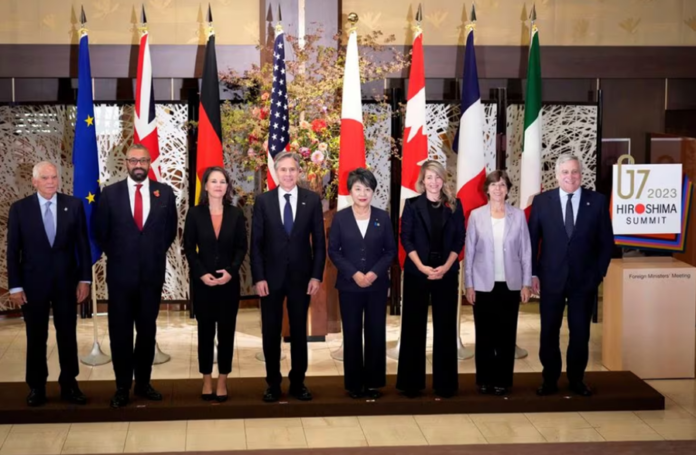G7 foreign ministers on Wednesday issued a “unified message” on the Israel–Hamas war, including a call for a humanitarian pause in the fighting and a “peace process,” Japan‘s top diplomat said, even as Israeli forces continue to strike the Gaza Strip, according to Reuters.
Winding up a two-day meeting in Tokyo, the Group of Seven wealthy nations said in a joint statement that Israel had the right to defend itself, while underscoring the need to protect civilians and to comply with international humanitarian law.
It was only the second joint statement from the G7 since gunmen from the Palestinian militant group Hamas sparked the conflict with an October 7 attack on southern Israel, killing 1,400 people and taking some 240 hostages.
The Israeli bombardment of Gaza has since killed more than 10,000 Palestinians, around 40% of them children, according to counts by health officials in the Hamas-ruled territory.
“I believe it’s important that the G7 was able to put out its first unified message as a statement… regarding a humanitarian pause and a future peace process, both in terms of the responsibility the G7 has towards the international community and for Japan as this year’s chair of the G7,” Japanese Foreign Minister Yoko Kamikawa told reporters.
The statement did not specify what that peace process was beyond stressing that a two-state solution „remains the only path to a just, lasting, and secure peace”.
The communique also reiterated G7 support for Ukraine in its war with Russia, highlighted the need for engagement with China over shared concerns, and condemned North Korea’s missile tests and arms transfers to Russia.
The G7 comprises Britain, Canada, France, Germany, Italy, Japan, the United States, with the European Union also taking part in the summit.
Israeli Prime Minister Benjamin Netanyahu has said Israel would consider “tactical little pauses” but, alongside its close ally the United States and other Western countries, has rejected calls for a ceasefire that it says would allow Hamas to regroup.
The G7 had appeared to struggle to agree on a firm, united approach to the war, raising questions over its relevance as a force to tackle major crises.
The only other G7 statement came after a meeting of its finance ministers on October 12 and amounted to a few, brief sentences. Other group members have issued joint statements.
G7 divisions have also been evident at the United Nations, with France voting in favour of a resolution calling for a humanitarian truce in the conflict on October 26, the U.S. opposing it and the group’s other members abstaining.
At a working dinner on Tuesday, the ministers also discussed what happens after the Gaza conflict recedes and how to revitalise peace efforts in the Middle East, Japan said in a statement.
It gave no details of options being discussed if the Hamas militant group is ousted from Gaza.
Israel has been vague about its long-term plans for Gaza. In some of the first direct comments on the subject, Netanyahu said this week that Israel would seek to have security responsibility for Gaza „for an indefinite period”.
But Israeli Foreign Minister Eli Cohen told the Wall Street Journal that Israel wanted the territory to be under an international coalition, including the U.S., European Union and Muslim-majority countries, or administered by Gaza political leaders.
Diplomats in Washington, the United Nations, the Middle East and beyond have also started weighing the options.
Discussions include the deployment of a multinational force to post-conflict Gaza, an interim Palestinian-led administration that would exclude Hamas politicians, a stopgap security and governance role for neighbouring Arab states and temporary U.N. supervision of the territory, Reuters reported this month.
After Tokyo, U.S. Secretary of State Antony Blinken heads for his first visit to South Korea in more than two years, with talks set to focus on strengthening the Washington-Seoul alliance amid growing concern over North Korea’s military ties with Russia.


